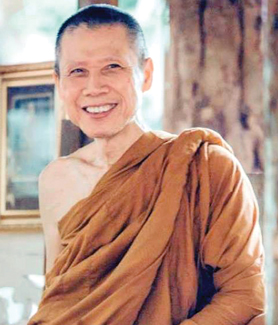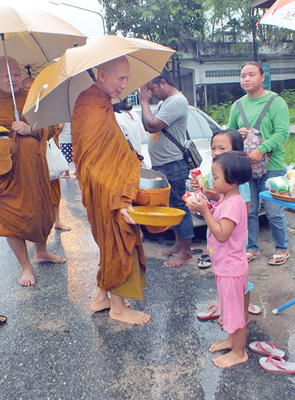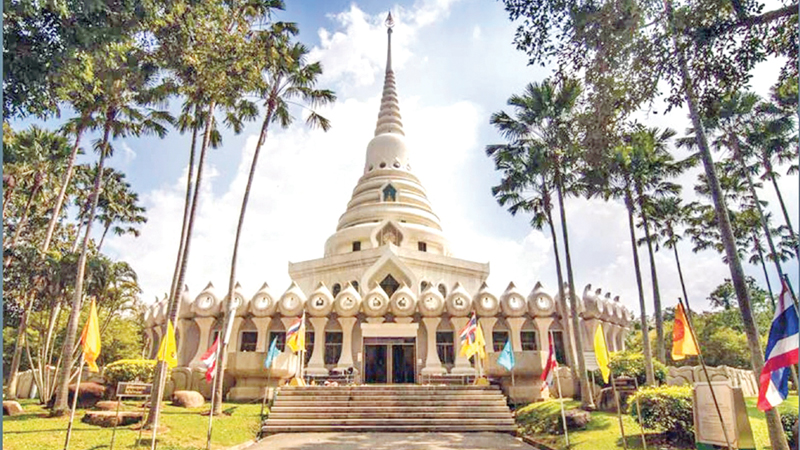Following are excerpts from an interview with Theravada Bhikkhu Ven. Ajahn Suchart Abhijato Maha Thera of Thailand. The Maha Thera is well known across the globe for his effective Dhamma teaching methods and meditation practice.

Ven. Ajahn Suchart Abhijato Maha Thera
Q: Do individual life spans have a predetermined nature, with some experiencing healthy and long lives while others meet an untimely end? Is the duration of one’s life solely determined by past Kamma, or are there other factors at play in determining the number of years one will live in this life?
A: There are many causes, not only just past Kamma. The way/place you live can also affect you. If you live in Ukraine or Palestine right now, your chances of dying are substantially higher than if you lived in Sri Lanka. So other causes also determine whether your life is short or long, not just Kamma alone.
Q: What are the other causes in particular?
A: The place one lives, whether it’s safe or not, whether there are diseases or not, the people you live with, and your own behavior.
If you smoke, drink, and use drugs – these things can shorten your life, so there are many causes, so you must study and learn to prevent the causes that will shorten your life, so you can live a longer life. But you have got nothing to do with your past Kamma, because it is already done.
Q: Some people give to charity with the expectation of receiving something in return. What is the most effective type of charity?
 A: The best form of charity is to be like Santa Claus. Santa Claus does not expect anything in return. He gives things away. As he sees the receiver become happy, he is happy. All he wants is that. He wants to feel happy. That is the purpose of giving to charity.
A: The best form of charity is to be like Santa Claus. Santa Claus does not expect anything in return. He gives things away. As he sees the receiver become happy, he is happy. All he wants is that. He wants to feel happy. That is the purpose of giving to charity.
Q: This question is regarding meditation. If we find it difficult to concentrate on breath during meditation and if our mind continues to go further away from the breath focus, what can we do?
A: You have to use the Mantra ‘Buddho, Buddho.’ If the mantra does not work, you have to do some chanting – chant some verses and keep chanting until your mind comes back and you can watch your breath. Then you can watch the breath again. If you find chanting is useful -you can calm your mind, and make your mind free from restlessness and agitation- then you can keep using chanting as a way of meditating also.
Q: Do we need to practise Metta meditation or Asubha meditation first before focusing on Anapanasati meditation?
A: No, you do not need to. You need to practise mindfulness first. If you do not have enough mindfulness, you will not be able to watch your breath. Asubha and Metta are for specific use. For example when you are angry at somebody and it prevents you from meditating then you have to use Metta meditation -you have to forgive the person who made you angry/who offended you. Similarly, if you have any sexual desires, you must practise Asubha meditation to calm them down. Then you can come back and meditate. But if you do not have any of these issues then you do not need to do any of these meditations [ such as Metta or Asubha before Anapanasathi ]. But you might have to do a lot more mindfulness than any meditation practice [ such as Metta or Asubha] in order to concentrate your mind.
That means you have to do more mindfulness before you come in and practise Anapanasati. If you start to develop mindfulness at the time when you do meditation, you won’t have strong enough mindfulness to calm your mind.
Q: Should we discontinue meditation if we continuously get disturbing thoughts during meditation and start it after a while?
 A: Well, if you find it impossible to continue then you should stop. But there is a way that you can continue, it’s whether you want to do it or not. You can use the Mantra ‘Buddho Buddho’ or you can go through the 32 parts of the body. Reciting the names of the body parts: hair of the head, hair of the body, nails, etc. Keep doing it repeatedly until your mind becomes calmer and wants to continue to meditate. Mantra will always solve a lot of these problems.
A: Well, if you find it impossible to continue then you should stop. But there is a way that you can continue, it’s whether you want to do it or not. You can use the Mantra ‘Buddho Buddho’ or you can go through the 32 parts of the body. Reciting the names of the body parts: hair of the head, hair of the body, nails, etc. Keep doing it repeatedly until your mind becomes calmer and wants to continue to meditate. Mantra will always solve a lot of these problems.
Q: What advice do you have to offer to people who find it difficult to concentrate on meditation practice due to a traumatic past experience?
A: Well, the problem is they do not have much mindfulness. So when they meditate they cannot prevent the mind from going and thinking about other things.
One way to fix this problem is to do more mindfulness before you meditate. And then when you meditate if you still have this disturbing thought, you should switch from watching the breath to using the Mantra instead or do some chanting until this disturbing thought stops coming in. Then you can come back and watch your breath again.
Q: When it comes to animals, just like human beings, some are better off than others. For example, Zoo animals lead miserable lives with restricted freedom while the animals live in the wild, live a carefree life. Does an animal living in a Zoo with limited freedom have to suffer in that manner due to a bad Kamma it had performed in a previous birth?
A: It depends on how you look at it. Sometimes the cage is good, you are protected. And you are provided with food. But if you live in the wild then you have to look for your own food. Then you have to look after your life because you might end up being eaten up by some other animal. So it is a matter of how you look at it. And good or bad Kamma sometimes does not have anything to do with this situation – it just happens to be happening just like being born in the wrong place at the wrong time. But the best way to solve this is to accept your lot -if you are in the cage accept it, you won’t feel any stress, if you live in the wild, just accept it!
Q: To what extent can we change our past Kamma? For example, if a person is destined to live a short life due to his past birth’s bad Kamma (such as killing living beings,) can he expect a longer life during this birth by engaging in meritorious acts such as releasing animals from slaughterhouses or setting caged birds free?
A: According to the Buddha, this is an imponderable subject so he didn’t want us to ponder on it. For us, all we have to understand is good Kamma produces good results, bad Kamma produces bad results. How Kamma interacts with each other is beyond our ability to comprehend. So just don’t worry about it.
Q: Certain tiny creatures such as worms are born from dirt. Can a human being be born as a worm or a similar creature? Could you go into further detail on Buddhia’s teaching on this?
A: Worms and the human body are similar. Worms are not made from dirt alone. Worms are made from the Four Elements and dirt just happens to be the earth element. All bodies of the living organism have to have the Four Elements for them to exist.
But the form of the worm might look different -the human body might be bigger and that of the worm might be smaller. But humans and worms are still alike – in terms that they have bodies and a mind that connects to a body. Just like the human body is connected to the mind. After our human body dies, due to our bad Kamma, our mind might reconnect with the body of an animal. So it depends on your good or bad Kamma.
If you do a lot of bad Kamma – if you keep breaking the Five Precepts your mind might reconnect with a worm, with a cat, with a bird, or any animal.
If you do not want to reconnect with animals in your future life then you have to keep the Five Precepts. – don’t kill, don’t steal, don’t lie, and do not commit adultery. Then you will not have to be reconnected to the body of an animal
Q: Given the religion’s emphasis on Dukkha, some argue that a Buddhist cannot live an optimistic life. What is your explanation?
A: Buddhism does not place sole emphasis on Dukkha. It also equally emphasises the cessation of Dukkha. The Four Noble Truths consist of Dukkha, and the Cessation of Dukkha. So it is not a pessimistic religion, it is a positive, optimistic religion. It tells us that we are suffering now. But we can get rid of our suffering if we follow the Noble Eightfold Path.
So it is a very optimistic religion. But people do not see it that way. I do not know why – maybe because they did not study it hard enough. They only hear about Dukkha., but they never heard of the cessation of Dukkha.
– Ven. Ajahn Suchart Abhijato Maha Thera was born on November 2, 1947. Having completed his degree in Civil Engineering at California State University, Fresno, USA, he returned to his motherland where he designed an ice cream parlour for a brief stint.
Quite soon, inspired by a Dhamma book, he decided to go in search of “true happiness,” to find inner peace through the practice of Buddhist meditation. He became a bhikkhu at the age of 27 and received ordination at Wat Bovornives in Bangkok on February 19, 1975, with Somdet Phra Ñanasarivara, the late Supreme Patriarch (Somdet Phra Sangharaja), as his preceptor.
Ven. Ajahn Suchart Abhijato Maha Thera resides in Wat Yansangwararam, Thailand.






